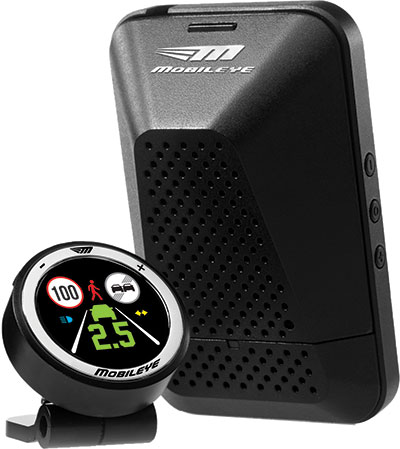Intel’s $15.3-billion deal to acquire autonomous driving technology company Mobileye will put the Santa Clara, Calif., chipmaker at the center of the growing market for self-driving trucks and cars.
When it announced the acquisition Monday, Intel said it aimed to become a leading technology provider for autonomous vehicles. Intel estimates the vehicle systems, data and services market could reach $70 billion by 2030.
But while Mobileye already has a high-profile deal with BMW and Intel to develop fully self-driving vehicles for production in 2021, much of its business now is designing autonomous safety systems for heavy trucks.
Mobileye’s sensor-based systems warn drivers of pending hazards and automatically apply the brakes if the software believes a crash is imminent. Giant trucking companies are purchasing the systems as a move to improve fleet safety and reduce collisions.
YRC Worldwide of Overland Park, Kansas, is pushing the technology into the fleets of its two trucking subsidiaries, Holland and Penn Motor Express.
Holland retrofitted 4,000 trucks with Mobileye’s 560 Advanced Driver Assistance System last year. The forward-facing smart camera is mounted on the front windshield inside the truck. Mobileye’s technology creates a digital view of what is around the truck — reading traffic signs and lane markings — and alerts drivers of potential threats from vehicles, pedestrians and other hazards.
“We went with Mobileye because of the ease at which it could be installed on our fleet,” Scott Ware, president of Holland, told Trucks.com.
He said Mobileye, which is based in Israel, has industry leading brand recognition as a producer of collision avoidance systems.
Sister carrier New Penn Motor Express also added the Mobileye technology to its 750-truck fleet.
While much of investor focus anticipates future sales in the light-vehicle side of the business, selling systems for trucks is where Mobileye’s fastest growth is taking place.
Its aftermarket business grew 113 percent last year, according to analyst Brad Erickson of Pacific Crest Securities. The company’s chip side, which works with automakers, grew 34 percent in 2016.
Some of the earliest adopters of Mobileye’s technology were in the heavy-duty truck market, said Michael Backman, general manager of Mobileye in the U.S. and Canada.
“The over-the-road trucking market had a more mature understanding of the safety aspects of our systems,” Backman told Trucks.com.
Mobileye technology can help trucking fleets achieve up to a 60 percent reduction in overall collisions and a 90 percent reduction in forward collisions, he said.
Truck manufacturers are starting to incorporate the technology into their new vehicles.
Mitsubishi Fuso plans to offer Mobileye 6 Series Collision Avoidance Systems on all of its 2017 Fuso FE and FG series medium-duty commercial trucks.

Mobileye’s hardware. (Photo: Mobileye)
“We recognize that driver efficiency and safety have direct impact on the bottom line for all of our Fuso customers,” said Otto Schmid, director of product management for Mitsubishi Fuso. “The Mobileye collision avoidance system has proved itself in our testing to reduce the number of incidents that trigger warnings for tailgating, lane departure, urban collision and rural highway collision by 50 percent.”
Mobileye is also working with European commercial vehicle manufacturers — including MAN and Scania, both owned by Volkswagen Group, as well as Iveco, an Italian commercial vehicle — to provide collision mitigation technology.
Mobileye has partnered with Bendix Commercial Vehicle Systems to develop a fully-automated safety and braking system called the Bendix Wingman Fusion. Truck manufacturers like Kenworth, Volvo and Navistar all use Wingman Fusion’s collision mitigation system, which is powered by a Mobileye System-on-Chip EyeQ processor.
Last year, Mobileye announced its partnership with Meritor Wabco, a major safety supplier in commercial vehicles, to develop systems that combine Wabco’s advanced emergency braking functions with Mobileye’s Road Experience Management technology, also using EyeQ4 chips.
Intel’s pending purchase of the company, which is expected to close late this year, represents an enormous bet on driverless technology, said Mike Ramsey, an analyst with Gartner Inc.
The company is paying more than $15 billion for a business that had just $358.2 million in sales in 2016.
As competitors ramp up to challenge Mobileye, Richard Hilgert, an analyst for Morningstar Research Services, said other companies are still years away from catching up.
“To steer, accelerate, brake and react — all of those things enable autonomy,” Hilgert told Trucks.com. “Mobileye has a very specific piece that interprets the image data, which is difficult to do, and that is the real estate that Mobileye has carved out for itself.”
Although the commercial truck segment of Mobileye’s business is ramping up quickly now, the company’s long-term growth will be in the passenger vehicle market, he said.
“There’s just an enormous difference in the number of passenger vehicles versus commercial vehicles that are produced,” Hilgert said.
About 500,000 medium- and heavy-duty commercial vehicles are produced in the U.S. and Europe annually compared with 35 million passenger vehicles.
However, truck driver turnover, fuel efficiency demands and long hours behind the wheel will contribute to an increased demand for autonomous vehicle technology in the trucking industry, Hilgert said.
Source: Trucks
